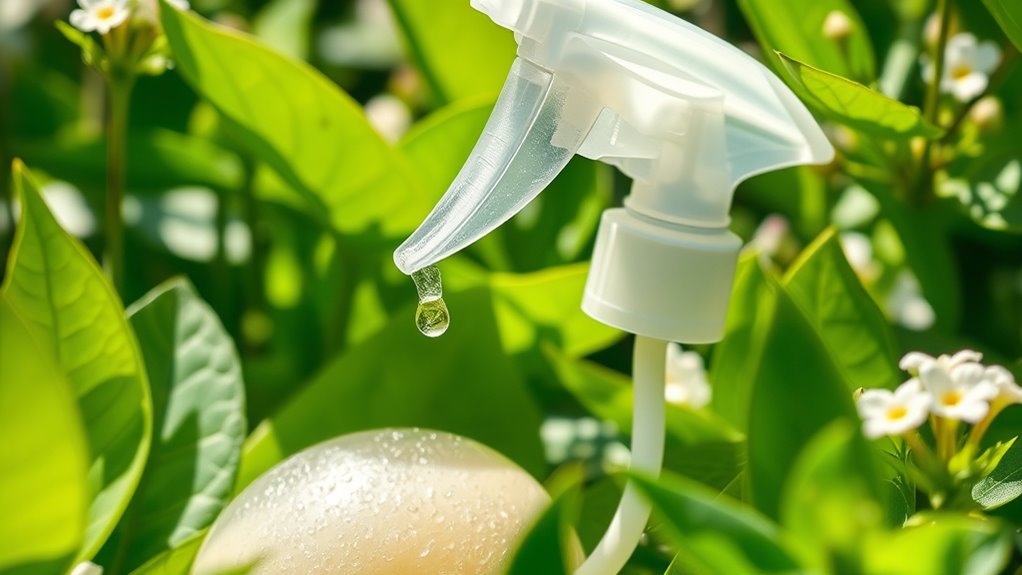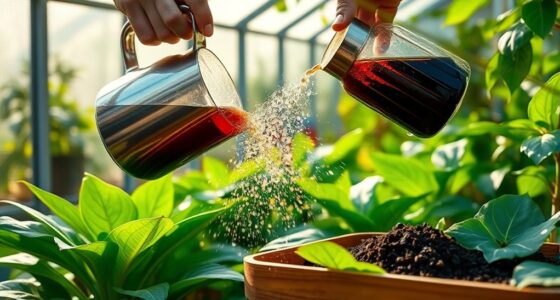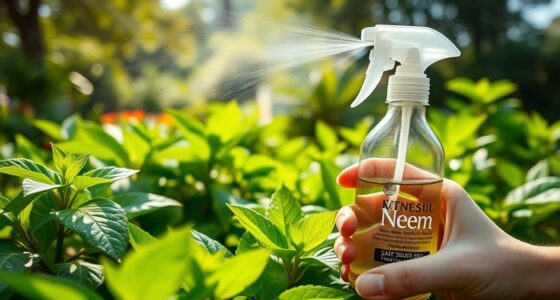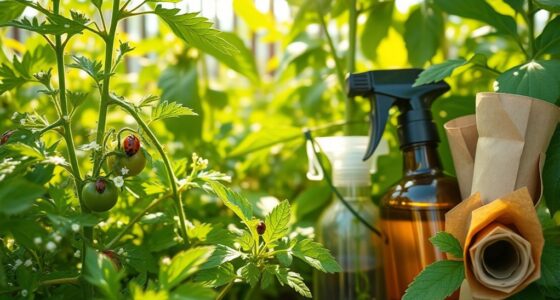To create a simple, effective DIY natural insecticide, mix 1-2 tablespoons of liquid soap—like castile or biodegradable soap—in a quart of water. Shake well and spray thoroughly on affected plants, especially on undersides of leaves where pests hide. Repeat every few days or after rain until pests decline. Using soap sprays helps control pests safely, preserves beneficial insects, and supports eco-friendly gardening—keep exploring to learn more about this easy pest control method.
Key Takeaways
- Soap sprays are a safe, eco-friendly alternative to chemical insecticides, targeting soft-bodied pests without harming beneficial insects.
- Use biodegradable liquid soap mixed with water (1-2 tablespoons per quart) and shake well for an effective DIY insecticide.
- Apply thoroughly to all plant surfaces, especially undersides of leaves, and repeat every few days or after rain for best results.
- Conduct a patch test before full application to prevent plant damage and ensure compatibility with your plants.
- Incorporate soap sprays into an integrated pest management strategy to promote a healthy, balanced garden ecosystem.
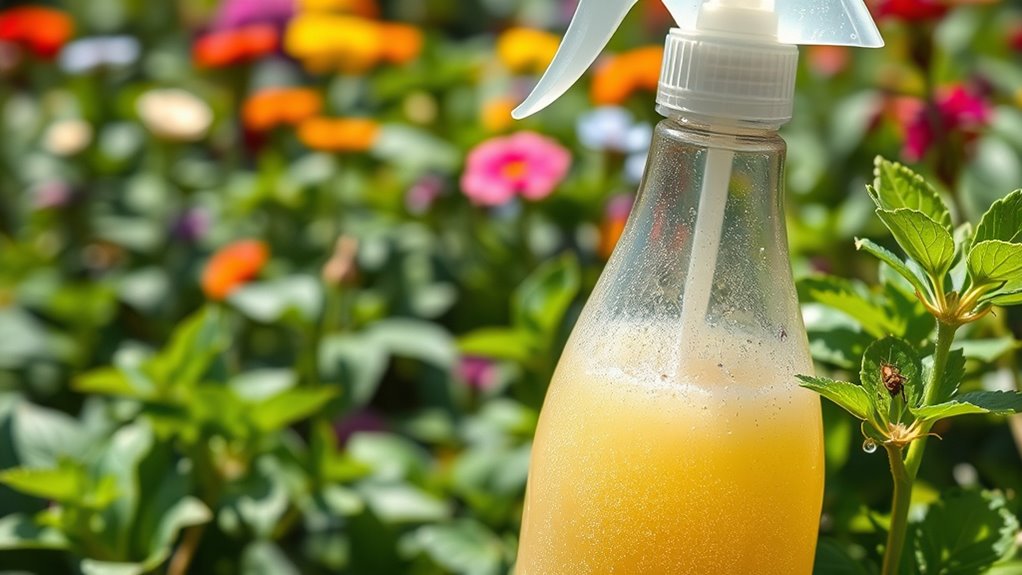
Are you tired of using harsh chemical insecticides in your garden? If so, you’re not alone. Many gardeners are seeking safer, more eco-friendly ways to protect their plants without harming beneficial insects or the environment. Soap sprays offer an excellent solution—simple, affordable, and effective. These DIY natural insecticides serve as chemical alternatives that target pests while preserving the beneficial insects that help your garden thrive. Unlike synthetic pesticides, soap sprays work by disrupting the cell membranes of soft-bodied insects like aphids, spider mites, and whiteflies, causing them to dehydrate and die. They’re gentle enough to use regularly without risking harm to pollinators such as bees and butterflies, which are essential for healthy plant growth.
Creating your own soap spray is straightforward. You’ll need a few basic ingredients: liquid soap—preferably pure castile soap or a biodegradable, plant-based option—and water. Some gardeners add a small amount of oil, such as neem or neem-based oils, to enhance the insecticidal effect and help the solution stick to leaves. To make the spray, mix about one to two tablespoons of liquid soap into a quart of water. Shake the mixture well to combine. Before applying it broadly, always do a patch test on a small part of your plant to ensure it won’t cause any damage or leaf burn. Once confirmed safe, spray the solution thoroughly on the affected plants, making sure to cover the undersides of leaves—where pests often hide. Repeat every few days or after rain, which can wash away the spray, until pests are under control.
Using soap sprays as part of your garden routine encourages a healthy balance in your ecosystem. They help manage pest populations without eliminating beneficial insects that naturally keep pests in check, like ladybugs and lacewings. This approach aligns with sustainable gardening practices, promoting a healthier environment and reducing chemical runoff into soil and water sources. Soap sprays are also cost-effective—since you probably already have the ingredients at home—and versatile, as you can tailor the strength and ingredients based on your specific needs. Remember, the key to success with DIY insecticides is consistency and observation. Keep an eye on your plants, and adjust your treatments as needed, always prioritizing the well-being of beneficial insects and the overall health of your garden. This way, you create a thriving, balanced garden ecosystem free from the dangers of chemical pesticides.
Frequently Asked Questions
Are Soap Sprays Safe for Organic Gardening?
You’ll find soap sprays are generally safe for organic gardening when used correctly, as they don’t harm beneficial insects or plants. Since organic certification emphasizes eco-friendly practices, soap sprays with natural ingredients align well with those standards. Plus, they have a minimal environmental impact compared to synthetic chemicals. Just guarantee you use pure, biodegradable soaps and follow application guidelines to keep your garden truly organic and eco-conscious.
How Often Should I Reapply Soap Sprays?
Oh, the eternal question—how often should you reapply soap sprays? Well, it depends on the weather, really. Hot, sunny days? You’ll want to reapply more frequently, maybe every 5-7 days. Rainy weather? Hold off until the foliage dries. Keep an eye on your plants and pests; adjust the frequency of application so you don’t turn your garden into a soap suds spa.
Can Soap Sprays Harm Beneficial Insects?
You might wonder if soap sprays harm beneficial insects. While soap spray impacts are generally minimal when used correctly, they can affect beneficial insects like bees and ladybugs if sprayed directly. To guarantee beneficial insect safety, apply soap sprays during early morning or late evening when these insects are less active. Always target affected plants and avoid broad spraying to protect helpful bugs while controlling pests effectively.
What Types of Soap Are Best for DIY Sprays?
Think of soap as a gentle warrior for your garden. The best DIY soap sprays use pure, biodegradable soaps like castile or insecticidal soap, which have a pH balance close to neutral. Keep soap concentration low—around 1-2%—to avoid harming plants or beneficial insects. Avoid harsh detergents or degreasers, and always test a small area first. Your garden will thank you for using safe, effective soap options.
How Do I Store Leftover Soap Spray Solution?
You should store leftover soap spray solution properly to maintain its effectiveness. Use airtight containers and keep them in a cool, dark place away from direct sunlight. Follow proper storage tips to prevent contamination and evaporation. Typically, the shelf life of homemade soap spray is about one to two weeks. Always label your containers with the date made, and discard any solution that develops an off smell or changes in appearance.
Conclusion
Just like a gentle knight defending a castle, your soap spray creates a natural barrier against pests. With a simple mix and a steady hand, you become the hero your garden needs, keeping harmful insects at bay without harsh chemicals. Remember, every spray is a small act of guardianship—protecting your plants as if you’re tending a delicate, thriving kingdom. Embrace this DIY approach, and watch your garden flourish under your careful, natural care.
